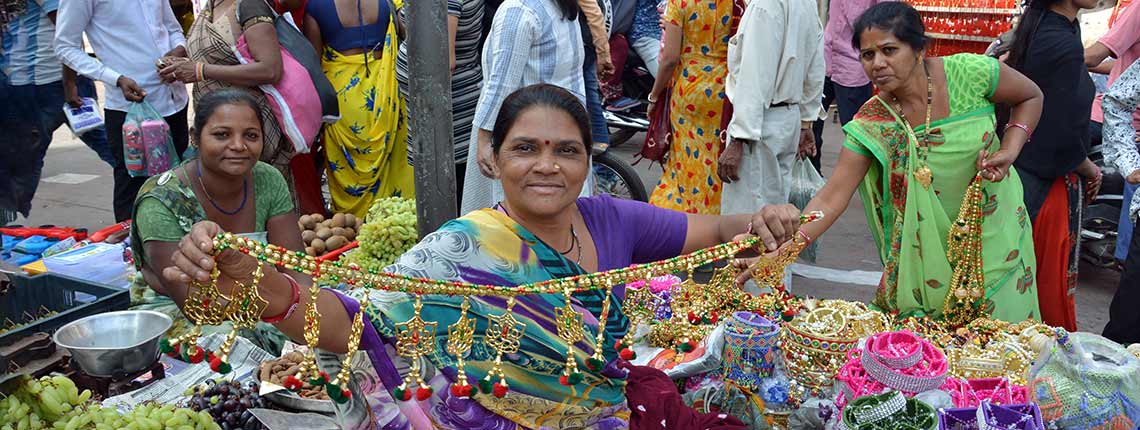A street vendor leader from Gujarat, India, said that, during the pandemic, city residents spurned him and other informal workers. “They looked at the vendors with hatred, didn’t let them come near … They said that the corona spreads through them,” he said. In Malaysia, fearing that migrant street vendors would spread the virus to locals, the government banned wholesale market vendors from employing foreign national assistants.
And, while battling this stigma, street and market vendors who were allowed to work during the pandemic had additional occupational health and safety costs to bear.
WIEGO’s analysis of the implications of COVID-19 laws for street vendors in India, Malaysia, Pakistan, the Philippines, Sri Lanka, Thailand and Vietnam shows that the laws and regulations for workers’ occupational health and safety were limited primarily to the formal workplace, with street vendors largely left to use their own resources for securing COVID-19 tests, sanitizing and implementing safety protocols.
Even before COVID-19, informal workers such as street vendors were excluded from occupational health and safety laws at national level, contrary to international law. The Universal Declaration of Human Rights and the United Nations International Covenant on Economic, Social and Cultural Rights guarantee a safe working environment for everyone, which covers all workers without qualification. In addition, the ILO Decent Work Agenda emphasizes the protection of rights at work – including occupational health and safety – for all workers, “whether organized or not, and wherever work might occur, whether in the formal or the informal economy, whether at home, in the community or in the voluntary sector”.
Informal workers bear the health and safety costs
Street vendors who work in public spaces controlled by local authorities routinely face occupational health threats from air pollution, long periods of physical exertion, limited or no water and sanitation facilities, and exposure to weather elements. These are exacerbated by the fact that occupational health and safety laws do not recognize or accommodate their needs, making it impossible for street vendors to use these laws to demand infrastructure and services that promote their health and safety at work – access to clean water, toilets, electricity, sanitation, refuse removal, shelters and health assessments. As a result, street vendors and their families bear the costs of maintaining a healthy and safe workplace and of receiving health care.
With COVID-19, governments introduced laws and policies to help workers mitigate the new occupational risks. These established behavioural mandates and guidelines and allocated the costs of health and safety protections. Our regional analysis shows that while some of the laws targeted or included street vendors, the vendors were not entitled to the full spectrum of protections extended to formal workers. It shows that even when there were specific provisions for street vendors, they were largely non-binding instruments such as guidelines. Thailand was the exception, having binding legislation that regulated the health and safety of workers.
In several countries, street vendors were subject to provisions requiring masking, hand hygiene and social distancing in workplaces, public spaces and/or markets. But the provisions allocating responsibility for the associated costs presupposed an employment relationship in a formal workplace such as a factory or shop. Recognizing their members’ plight, street vendor organizations in India and Thailand provided their members with masks and hand sanitizers. We identified a few instances where governments assumed the costs. In Delhi, the regulations required that the Municipality Corporation regularly sanitize vending spaces for the sale of essential items such as produce, but this only applied to areas where the number of COVID-19 cases was high. In Malaysia, while local authorities disinfected markets and trading areas, the COVID-19 laws did not expressly require this, and so street vendors could not claim it as a right.
Holding governments accountable for health and safety
COVID-19 testing was one area where some governments assumed the financial burden of preventative measures. In the Philippines, market vendors were recognized as priority economic workers and were eligible for quarterly testing. In Malaysia, authorities targeted some markets for testing. However, the targeting of street vendors was a double-edged sword as, in some cases, vendors felt that testing was driven by prejudice. In Sri Lanka, a vendor said, “The police randomly conduct tests as if we were the only vulnerable crowd.”
The COVID-19 crisis laid bare the structural inequalities caused by the lack of recognition of informal vendors as workers entitled to labour rights and protection. WIEGO’s analyses of the pandemic laws that regulated informal work in Africa and Latin America provide further evidence of this.
However, some city and country examples could serve as lessons for others. Namibia adopted laws that imposed a duty on local authorities to provide water, sanitation and toilets. In Latin America, Bolivia placed responsibility on local authorities to sanitize public markets. One may ask whether local authorities can afford the financial responsibility that comes with these obligations. Our counter to that is how can local authorities not afford to invest in measures that could increase the productivity of workers who contribute significantly to local economic development? Street vendors pay various taxes, levies and fees; bring diversity and vibrancy to local economies; and those who sell foodstuffs promote food security by providing accessible retail options. Moreover, they create jobs, including for those who provide ancillary services such as security and transport.
The rights of “everyone” or “every worker” laid down in international law should be the bedrock for building more inclusive cities. Realizing health and safety in public workplaces will require the provision and maintenance of physical and other infrastructure. Street and market vendors need legislation in place that enables them to hold governments accountable for providing this infrastructure and a safe work environment. The translation of these rights should include the voices of workers at every step, heeding the call of informal worker organizations such as Streetnet International – “Nothing about us without us”.
